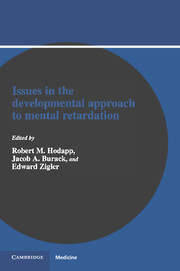Book contents
- Frontmatter
- Contents
- Preface
- Contributors
- Part 1 Developmental theory
- Part 2 Applying developmental theory to different types of retarded individuals
- 7 Cultural–familial mental retardation: A developmental perspective on cognitive performance and “helpless” behavior
- 8 The organization and coherence of developmental processes in infants and children with Down syndrome
- 9 Developmental issues in fragile X syndrome
- 10 Deviance and developmental approaches in the study of, autism
- 11 The issues of multiple pathways in the development of handicapped children
- 12 Summing up and going forward: New directions in the developmental approach to mental retardation
- Author index
- Subject index
12 - Summing up and going forward: New directions in the developmental approach to mental retardation
from Part 2 - Applying developmental theory to different types of retarded individuals
Published online by Cambridge University Press: 07 September 2010
- Frontmatter
- Contents
- Preface
- Contributors
- Part 1 Developmental theory
- Part 2 Applying developmental theory to different types of retarded individuals
- 7 Cultural–familial mental retardation: A developmental perspective on cognitive performance and “helpless” behavior
- 8 The organization and coherence of developmental processes in infants and children with Down syndrome
- 9 Developmental issues in fragile X syndrome
- 10 Deviance and developmental approaches in the study of, autism
- 11 The issues of multiple pathways in the development of handicapped children
- 12 Summing up and going forward: New directions in the developmental approach to mental retardation
- Author index
- Subject index
Summary
The contributors to this book were asked to perform a difficult task – to specify what has come to be known as the developmental approach to mental retardation. They were asked to delineate what general developmental theory, findings, and perspectives tell us about retarded development, and what mental retardation research tells us about general developmental processes. The hope is that by joining findings from these two areas we can gain a clearer understanding of both normal development and mental retardation.
The construction of a comprehensive developmental approach to mental retardation is difficult to accomplish because it encompasses two topics that many consider to be incompatible. On the one hand, developmental theorists have typically considered only nonhandicapped persons when discussing the nature of developmental processes. Even in debates concerning individual differences and the universality of development, little attention has been paid to the development of mentally retarded persons. Similarly, debates about sequences, structures, and environments have also been conducted without regard to evidence from retarded populations (see Inhelder, 1968, and Woodward, 1979, for notable exceptions).
On the other hand, researchers of mental retardation have had little use for general developmental theory. Mentally retarded persons have traditionally been viewed as different from other persons in that they suffer from one or a few specific defects; their functioning has therefore been judged to be incompatible with traditional developmental theory.
Information
- Type
- Chapter
- Information
- Issues in the Developmental Approach to Mental Retardation , pp. 294 - 312Publisher: Cambridge University PressPrint publication year: 1990
Accessibility standard: Unknown
Why this information is here
This section outlines the accessibility features of this content - including support for screen readers, full keyboard navigation and high-contrast display options. This may not be relevant for you.Accessibility Information
- 4
- Cited by
